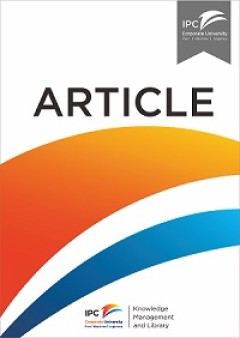Ditapis dengan

Managerial Decision Making
- Edisi
- -
- ISBN/ISSN
- -
- Deskripsi Fisik
- 240 p
- Judul Seri
- -
- No. Panggil
- SC TXT MAN k
- Edisi
- -
- ISBN/ISSN
- -
- Deskripsi Fisik
- 240 p
- Judul Seri
- -
- No. Panggil
- SC TXT MAN k

The Complete Manager
- Edisi
- -
- ISBN/ISSN
- 0-7045-0518-5
- Deskripsi Fisik
- 626 p
- Judul Seri
- -
- No. Panggil
- SC TXT THE d
- Edisi
- -
- ISBN/ISSN
- 0-7045-0518-5
- Deskripsi Fisik
- 626 p
- Judul Seri
- -
- No. Panggil
- SC TXT THE d

Hybrid approach for container terminals performances evaluation and analysis
Turnaround time, defined as the total time spent by a vessel within the port area, is one of the most important key performance measures for a container terminal. In this paper, the authors propose a hybrid approach based on simulation and genetic algorithms to investigate vessels’ turnaround time in a real container terminal under different scenarios characterised by increases in containers …
- Edisi
- Vol. 9, Nos. 1/2, 2014
- ISBN/ISSN
- -
- Deskripsi Fisik
- 9 p.
- Judul Seri
- Int. J. Simulation and Process Modelling
- No. Panggil
- ACT MG NIC h C.1

Applied improvisation training for disaster readiness and response
The purpose of this paper is to introduce applied improvisation (AI) as a tool for training humanitarian aid workers. AI incorporates principles and practices from improvisational theatre into facilitation and training. It is an excellent modality for training aid workers to deal with crisis and disaster scenarios where decision-making and collaboration under pressure are critical.
- Edisi
- Vol. 5 No. 1, 2015
- ISBN/ISSN
- -
- Deskripsi Fisik
- 25 p.
- Judul Seri
- Journal of Humanitarian Logistics and Supply Chain Management
- No. Panggil
- ATC LO VAN a

A model of supply chain and supply chain decision-making complexity
The objective of this paper is to develop a comprehensive model of supply chain and supply chain decision-making complexity that provides an understanding of the drivers of supply chain complexity and strategies to manage supply chain and supply chain decision-making complexity and outcomes.
- Edisi
- Vol. 41 Iss 1 pp. 63-82
- ISBN/ISSN
- 0960-0035
- Deskripsi Fisik
- 42 p.
- Judul Seri
- International Journal of Physical Distribution & Logistics Management
- No. Panggil
- ATC LO MAN a

Disentangling customer orientation – executiveperspective
Despite the fact that customer orientation is increasingly used as a strategic guideline to ensure companies’ long-term success, it is too often left at conceptual level without any managerial or executive translation. To address this practical gap, the purpose of the paper is to build an executive perspective on customer orientation through the mechanism of customer value dimensions.
- Edisi
- Vol. 20 No. 5, 2014 pp. 663-677
- ISBN/ISSN
- 1463-7154
- Deskripsi Fisik
- 17 p.
- Judul Seri
- Business Process Management Journal
- No. Panggil
- ATC MG SAA d

A Decision-Making Model For Reverse Logistics In The Computer Industry
Purpose – This paper seeks to present a decision-making model for manufacturers to maximize their profits in reverse logistics operations. Design/methodology/approach – A system dynamic model has been developed to complement with prior models and is validated using data collected from a computer company manufacturer handling returns with volumes transacted over a period of two years. F…
- Edisi
- Vol. 17 Iss 3 pp
- ISBN/ISSN
- 0957-4093
- Deskripsi Fisik
- 27 p
- Judul Seri
- The International Journal of Logistics Management
- No. Panggil
- ATC LO TAN a

Logistics firms performance: efficiency and effectiveness perspectives
The purpose of this paper is to assess the efficiency, effectiveness and performance of logistics companies in Singapore and Malaysia which are the growing logistics hubs in Asia by using a triangular data envelopment analysis (DEA). It also identifies various factors that significantly affect the efficiency, effectiveness and performance of the Singaporean and Malaysian logistics companies and…
- Edisi
- Vol. 64 No. 5, 2015
- ISBN/ISSN
- -
- Deskripsi Fisik
- 18 p.
- Judul Seri
- International Journal of Productivity and Performance Management
- No. Panggil
- ATC LO KAR l

Decision-making: Theory and practice
This paper compares a number of theoretical models of decision-making with the way in which senior managers make decisions in practice. Six prominent decision-makers were interviewed about their own decision-making style, as well as their use of decision support technology. Significant variation was found in personal decision-making styles. However, some central themes emerged, such as the imp…
- Edisi
- Volume 20 (2), pp. 143–160
- ISBN/ISSN
- 0529-191-X
- Deskripsi Fisik
- 18 p.
- Judul Seri
- -
- No. Panggil
- ATC LE TUR d

Managing priorities : a key to systematic decision-maaking
A central concern of systems engineering is selecting the most preferred alternatives for implementation from among competing options. The selection process is sometimes called tradeoff analysis, and is often built on the methods of decision analysis and utility theory. The process can be loosely divided into two parts, a first part in which one determines the relativepriority of various requ…
- Edisi
- -
- ISBN/ISSN
- -
- Deskripsi Fisik
- 19 p.
- Judul Seri
- -
- No. Panggil
- ATC LE GIL m
 Karya Umum
Karya Umum  Filsafat
Filsafat  Agama
Agama  Ilmu-ilmu Sosial
Ilmu-ilmu Sosial  Bahasa
Bahasa  Ilmu-ilmu Murni
Ilmu-ilmu Murni  Ilmu-ilmu Terapan
Ilmu-ilmu Terapan  Kesenian, Hiburan, dan Olahraga
Kesenian, Hiburan, dan Olahraga  Kesusastraan
Kesusastraan  Geografi dan Sejarah
Geografi dan Sejarah